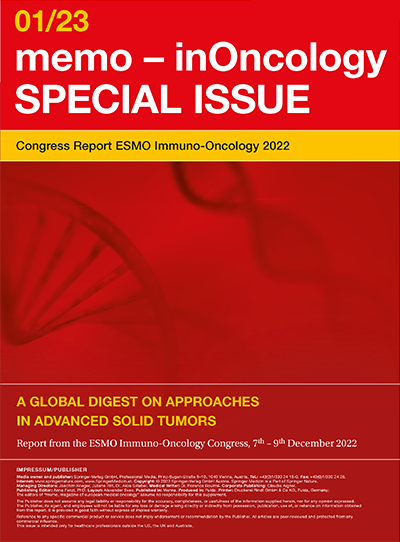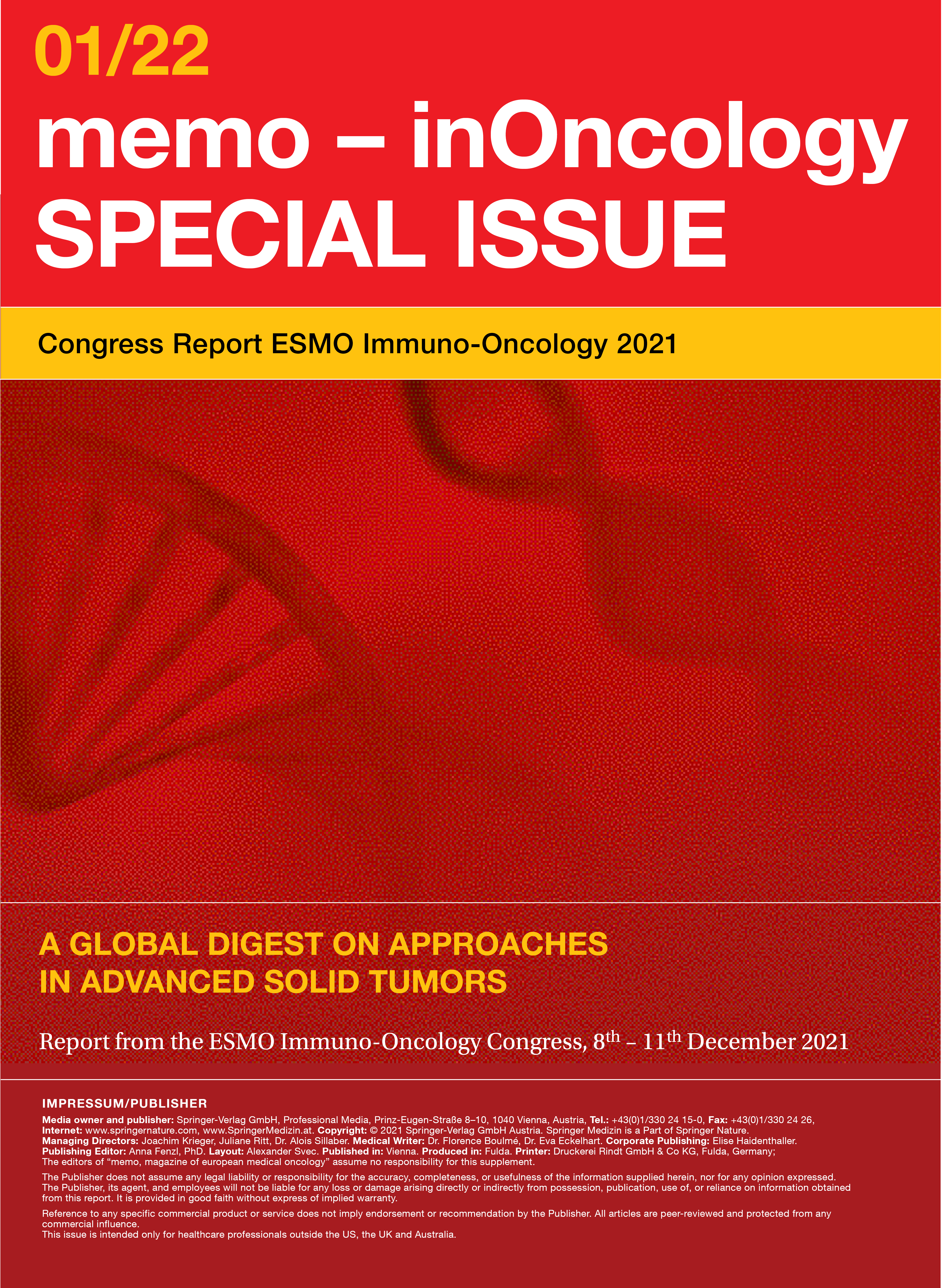ESMO Immuno-Oncology 2022 – Geneva, hybrid
Lecture Board: Jun Zhang, MD, PhD
Medical Writer: Florence Boulmé, PhD
Publishing Editor: Anna Fenzl, PhD
Preface – ESMO IO 2022
Preface - ESMO IO 2022 Matteo Simonelli, MD, Department of Biomedical Sciences, Humanitas University, Milan, Italy & Oncology Department, IRCCS Humanitas Research Hospital, Milan, Italy Dear Colleagues, The ESMO Immuno-Oncology Congress took place in Geneva, Switzerland, and virtually from 7th to 9th December 2022. In total, more than 2,000 participants from more than 100 countries attended one of the 31 sessions featuring over 249 presented abstracts, 6 late breaking abstracts, 6 prof
New strategies with PD-1/PD-L1 blockade in lung cancer
New strategies with PD-1/PD-L1 blockade in lung cancer Small-cell lung cancer (SCLC) accounts for about 15 % of all diagnosed cases of lung cancer and is characterized by a high proliferative rate, an early development of widespread metastases and a poor prognosis [1]. The five-year survival rate is less than 7 % [2]. More than two-thirds of patients with this highly aggressive neuroendocrine tumor are diagnosed with advanced or extensive-stage disease (ES-SCLC) [3]. For more than two decades
Emerging therapies in solid tumors
Emerging therapies in solid tumors BMS-986253 plus nivolumab and ipilimumab Interleukin-8 (IL-8), also known as chemokine (C-X-C motif) ligand 8, is a pro-inflammatory chemokine that exerts direct pro-tumorigenic effects primarily by recruiting immunosuppressive cells into the tumor microenvironment such as neutrophils and myeloid-derived suppressor cells. IL-8 has also been shown to promote cancer progression and resistance to therapy, by inducing angiogenesis, epithelial-mesenchymal tran
Conventional chemotherapy combined with PD-1/PD-L1
Conventional chemotherapy combined with PD-1/PD-L1 Neoadjuvant camrelizumab plus albumin-bound paclitaxel and cisplatin Neoadjuvant chemotherapy (CT), which has been the standard-of-care for resectable NSCLC, resulted only in modest survival benefits of approximately 5 %.
ESMO Immuno-Oncology 2021 – Geneva
Immune checkpoint blockade combined with chemotherapy in solid tumors
Lecture Board: Yunpeng Yang, MD; Li Zhang, MD
Established and novel chemo-free combinations in immuno-oncology
Lecture Board: Tibor Csőszi, MD; Shuxiang Ma, MD; Qiming Wang, MD, PhD
Medical Writer: Eva Eckelhart, PhD; Florence Boulmé, PhD
Publishing Editor: Anna Fenzl, PhD
Preface
Preface © Andrea Enderlein Prof. Wolf H. Fridman – Centre de Recherche des Cordeliers, Sorbonne Université, Institut national de la santé et de la recherche médicale, Université de Paris, Paris, France Dear Colleagues, The ESMO Immuno-Oncology Congress 2021 took place online from 8th to 11th December 2021.
Immune checkpoint blockade combined with chemotherapy in solid tumors
Immune checkpoint blockade combined with chemotherapy in solid tumors Pooled analysis of PD-1 inhibitor versus bevacizumab in NSCLC Non-small cell lung cancer (NSCLC) is a severe disease with poor outcomes since the majority of patients present with stage IV disease at diagnosis [1].
Established and novel chemo-free combinations in immuno-oncology
Established and novel chemo-free combinations in immuno-oncology LEAP-007: pembrolizumab plus lenvatinib in first-line NSCLC Immunotherapy was the major breakthrough in the treatment of lung cancer in the past years [1].
EXPERT VIDEOS
All video interviews from ESMO IO 2021
Mark G. Kris outlines the potential of circulating tumor DNA along the neoadjuvant cancer treatment timeline, explains which correlations have been observed between changes in ctDNA levels and clinical outcomes in patients with early-stage lung cancer and how monitoring of ctDNA can potentially be utilized in clinical practice to guide the management of these patients, while also depicting the limitations of this approach. The excitement in the field of lung cancer about new drugs targeting KRAS in combination with immunotherapy for first line treatment in stage IV NSCLC is addressed, too.
David McDermott deals with the question if combination therapy is superior to single agent PD-1/PD-L1 blockade in the adjuvant setting, highlights tools/biomarkers for appropriate patient selection for immune checkpoint inhibitor therapies, future strategies to potentially overcome resistance to ICIs, potential new outcome parameters for clinical trials investigating ICIs and highlights the most relevant findings presented at ESMO IO 2021 in terms of immuno-oncology.
Immunotherapy represents an exciting new option, particularly in patients with squamous cell cancer, and in prior or current smokers. In the CheckMate 017 trial, the PD-1 inhibitor nivolumab provided clinically meaningful and statistically significant overall survival benefit independent of PD-L1 expression in a population of previously treated patients with advanced squamous-cell lung cancer.






